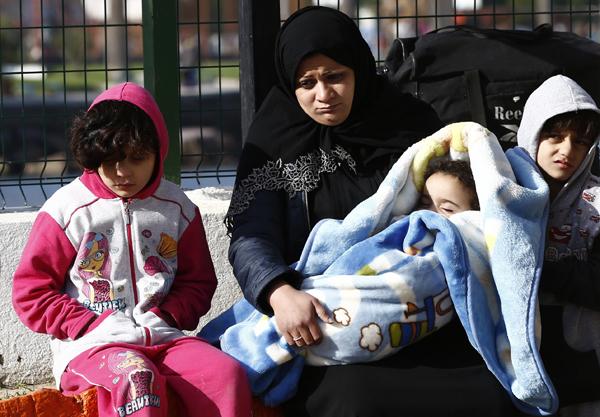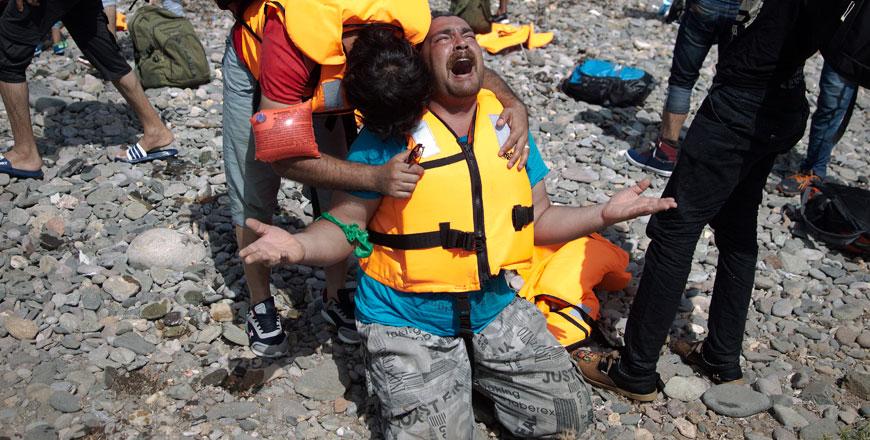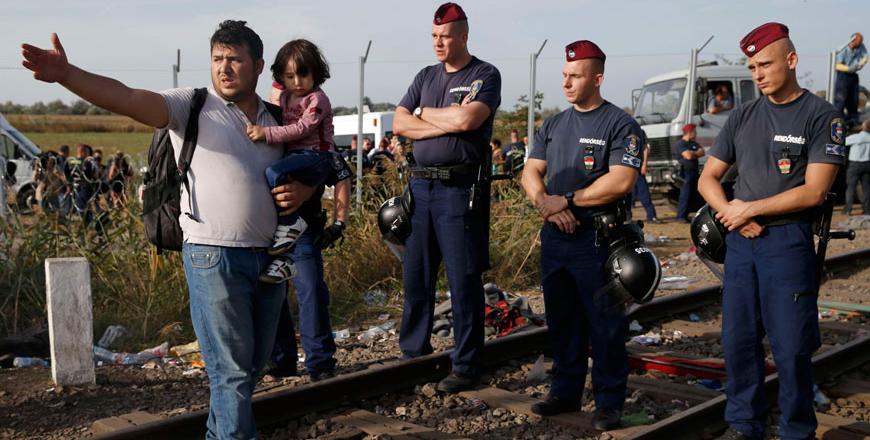You are here
EU proposes scheme to share out asylum seekers
By Reuters - May 04,2016 - Last updated at May 04,2016

A woman carrying her baby is helped up a slope at a makeshift camp for migrants and refugees near the village of Idomeni not far from the Greek-Macedonian border on Wednesday (AFP photo)
BRUSSELS — The European Commission proposed a system to distribute asylum seekers across the EU on Wednesday that aims to ease the load on states like Greece and Italy but drew immediate condemnation from governments in Eastern Europe.
The European Union executive published legislative proposals to reform the so-called Dublin system of EU asylum rules that includes a "fairness mechanism" under which each of the 28 states would be assigned a percentage quota of all asylum seekers in the bloc that it would be expected to handle.
The quotas would reflect national population and wealth and, if a country found itself handling 50 per cent more than its due share, it could relocate people elsewhere in the bloc. States could refuse to take people for a year — but only if they paid another country 250,000 euros per person to accommodate them.
"There is no a la carte solidarity in this Union," First Vice President Frans Timmermans told reporters. "This is a way to be able to show solidarity in a situation where... you are not able to take the refugees which were allocated to you."
But at a meeting in Prague, ministers from Poland, Hungary and the Czech Republic all repeated their opposition to the idea of relocation: "It makes no sense, it violates EU member states' rights," Polish Interior Minister Mariusz Blaszczak told reporters. Hungary's foreign minister called it "blackmail".
A two-year emergency relocation scheme was set up last year as Greece struggled to cope with the chaotic arrival of nearly a million people, many of them Syrian refugees, most of whom reached Germany. It was agreed over the furious objections of several central and eastern states, two of whom, Hungary and Slovakia, are contesting the quota system in the EU courts.
In fact, only 1,441 asylum seekers have been relocated out of the 160,000 allowed for under the current temporary scheme.
The proposals, which also include measures to speed up the process of handling asylum claims and tighter controls on the movements of migrants themselves, need backing from governments and the European Parliament — a process that officials expect to be an uphill battle and involve many amendments.
Germany, the bloc's main paymaster and destination for the bulk of migrants crossing the Mediterranean, has pushed hard for a permanent relocation system and has voiced frustration with the refusal of governments in the east who benefit the most from EU subsidies to take in asylum seekers.
Poland, Hungary and other formerly communist states say immigration, especially from the Muslim cultures of the Middle East, would disrupt their homogeneous societies. Governments also object to paying as an alternative to taking people in.
A similar proposal last year to set a payment of 0.002 per cent of GDP was not taken up in the temporary scheme. The Commission did not issue its quota figures. Last year's tables gave Germany a roughly 18 per cent share, France 14 per cent, Poland 5.6 per cent and Hungary 1.8 per cent.
‘Controversial’
Any reform of the system, from which Britain, Ireland and Denmark are exempt, will require majority approval by EU governments. But senior officials say EU leaders will try to avoid forcing a deal through over strong minority objections, as happened with the temporary relocation scheme last September.
Even the authors of the proposal admit it is "sensitive" and "controversial" but hope it bridges diverging expectations from member states, EU sources said.
Splits between east and west, north and south over migration have posed one of the biggest challenges the European Union has faced and leaders' main hope is that a new deal with Turkey to hold down the numbers arriving can take the heat out of a debate that has seen nationalist parties surge in polls across Europe.
Italy has led a push for reform of a Dublin system that gives responsibility for handling asylum claims to the first country migrants arrive in. The Commission last month floated a possibility of scrapping that in favour of a central EU system but has now favoured the relocation system.
Chaotic movements of migrants, including many allowed by Italy and Greece to head north without being registered, have thrown the bloc's cherished Schengen system of open borders into disarray, with governments putting up new barriers to travel.
EU officials hope that the deal with Turkey, from where the bulk of 1.3 million people reached Europe last year, will stem the flow and allow the Union to regain control of its external borders and hence restore order in the Schengen area.
Also on Wednesday, Brussels was expected to confirm a lifting of visa restrictions on Turks as part of the deal with Ankara. The EU is offering to take in refugees directly from Turkey, which hosts 2.7 million Syrians, and such resettlements would be taken into account in countries' quotas for relocation.
Related Articles
BRUSSELS — A divided European Union on Wednesday unveiled a fresh plan to shake up its failed asylum policy and force countries to share the
BERLIN/MUNICH — Struggling to cope with a record influx of asylum seekers, Germany told its European partners on Monday they must take in mo
ROSZKE, Hungary/VIENNA — Two decades of frontier-free travel across Europe unravelled on Monday as countries re-established border controls



















